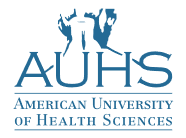By: Dr. Sara Kim, PharmD

Introduction/Background:
Since March 2020, many states have ordered residents to stay home and limit social interaction until further notice to try to slow the spread of COVID-19. Among adults, the risk for severe illness from COVID-19 increases with age, with older adults at highest risk. With the Centers of Disease and Control Prevention (CDC) recommendation for older adults to stay home and social distance, it is difficult for older adults to see their health care providers.
To continue providing care for the most vulnerable population during the COVID-19 pandemic, American University of Health Sciences, School of Pharmacy has set up an innovative telehealth service as an introductory pharmacy practice experience (IPPE) rotation. Students on the IPPE rotation remotely deliver medication management through telehealth platforms. Pharmacy students develop individualized care plan in collaboration with the patient. The care plan consists of intended goals of therapy and follow-up to determine patient outcome. Patient education is another component the students will provide during the service.
Method:
AUHS SOP pharmacy students are provided with a list of seniors who currently reside in Providence Gardens in Long Beach, CA. Provide Gardens is an apartment for seniors 62 years and older, with low to extremely low income. With 234 active residents, Providence Gardens’ service coordinator work with AUHS to provide a comprehensive wellness program and services including preventative care, health screenings, patient counseling, and medication therapy management.
With the list of Provide Gardens residents, students conduct an initial call to collect a comprehensive list of the residents’ medications (including prescription, non-prescription, vitamins, and herbal supplements). During the initial call, the students will also inquire about the residents’ wellbeing during the COVID-19 pandemic. Each initial call can take between 10 to 20 minutes. The medication list is documented and housed in a web-based software, AASC Online, that is accessible to the residents’ service coordinators, and pharmacy and nursing students. In addition to housing the medication list, the platform also house documentation of services provided, progress notes, intake log, outcomes tracking, real-time reporting, service referrals, and pharmacy, physician, specialist, and insurance information.
After collecting the patients’ medication list, students ensure each patient’s medications are individually assessed to ensure appropriateness for the patient, effectiveness for the medical condition, and safety (including black box warnings and drug-drug/food interactions). The process of assessing each medication and developing goals of therapy can take up to one day since the students are in the initial stage of the pharmacy curriculum. Students utilize resources such as Micromedex, Beers Criteria, and disease-specific guidelines to develop their care plan.
Their assessment is reviewed and discussed with clinical pharmacists prior to the second follow-up call. Other students on the IPPE rotation are also included in the discussion and are encouraged to provide comments, suggestions, and feedback.
A week after the initial phone call, students will call the resident back with their assessment, recommendation, and goals of therapy for the patient. Each call is conducted on speaker in class so students can learn from their peers. Facilitation of the discussion and phone calls in a classroom setting promotes teaching and learning experience for other students.
Results:
Final care plans are reviewed by the clinical pharmacist and documented in AASC Online. Medication-related problems and interventions are also documented as part of the data collection.
Pharmacy students on Introductory Pharmacy Practice Experience Ambulatory Care Rotation:
“….We are actively seeking manuscripts that highlight clinical pharmacists who are providing patient care using telehealth. This themed issue will address innovations that highlight clinical pharmacy services, including comprehensive medication management, using telehealth technologies.
…address improving the health of populations, enhancing the experience of care for individuals, reducing the per capita cost of health care (most likely cannot do this), or improving the care team experience.
Original research papers should include evidence related to the focus of at least one of these components.
Full-length reviews, succinct “how-to” papers, and brief descriptive reports of innovative models or unique clinical pharmacy services using telehealth are also welcome.
We suggest that authors reach out to us to discuss the nature and scope of the proposed paper before submission and to ask any questions. Address correspondence to: Dr. Melissa Badowski at badowski@uic.edu, Dr. M. Shawn McFarland at michael.mcfarland2@va.gov, and Dr. Jerry Bauman at jbauman@uic.edu. The manuscript deadline is January 15, 2021.
Our goal is to create a themed issue that serves as a resource for clinical pharmacists and health care administrators seeking to improve patient care through telehealth.”
A validated patient responsiveness survey: Blanchard C, Xu J, Roth McClurg M, Livet M. Reliability and validity of patient responsiveness survey for the Comprehensive Medication Management.
